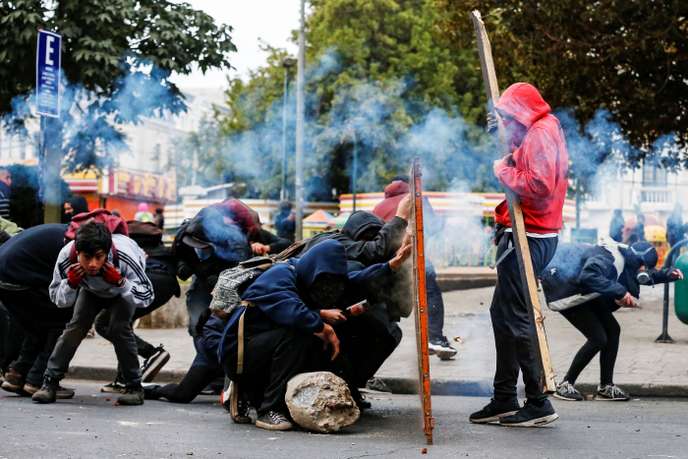Eleven people died this weekend during demonstrations caused by the rise in the price of the metro, a measure canceled since by the government.

Signs on the ground, buildings tagged, tear gas that grabs at the throat … Avenue Vicuña-Mackenna, main artery of downtown Santiago, the Chilean capital, looks like a battlefield Sunday, October 20. Some protesters marched in small, scattered groups, heading for Plaza Italia, the nerve center of the protest, where clashes with the police and the army have multiplied in recent days.
Some wear gas masks that are often hand-crafted around their necks, most of them holding a saucepan in their hands, which they make to a regular rhythm with a wooden spoon. The cacerolazosThese typical casserole concerts of the South American events are heard on every street corner in Santiago. " We will continue until this government gives us solutions so that we can live our lives with dignity "says Pilar Borges, in his 60s, according to which the Chileans " have grown tired of social injustice. "
On Sunday, President Sebastian Piñera (right) confirmed that the increase in the price of the subway ticket – announcement that set fire to the powder the week of October 14 – would be canceled. Without succeeding in soothing the anger of the Chileans, who continued to demonstrate, even after the curfew introduced for the second consecutive night in several cities of the country.
"Privatization of everyday life"
" The increase in the metro ticket is the straw that broke the camel's backbelieves Carlos Ruiz, sociologist and chairman of Fundacion Nodo XXI think tank. This explosion of social anger is primarily related to the extreme privatization of daily life: health, education, pensions, water … Here, the citizen is increasingly considered a consumer. "

Chile is one of the most unequal countries in the OECD. According to the United Nations, 1% of Chileans concentrate more than 25% of the wealth of the country. The cost of living is constantly higher: half of Chilean workers earn the equivalent of 500 euros or less per month. The price of the metro ticket in Santiago, which had to be raised from 800 to 830 pesos (around 1.04 euro) at peak times, would have become unpayable for many users. " We are tired of the dear life, the poor quality of public health, having to go into debt to study … "Liliana Silva, who has just finished her audiovisual studies, says she will have to pay back for twenty-five years, the age she currently has.
Sunday afternoon, Plaza Nuñoa, in the heart of the Chilean capital, filled with young people who came to protest peacefully. " We want to show that this movement is not violent, that the incidents are the result of a minority ", insists Luis Santana, 27 years old.
"Powerful Enemy"
New looting and looting of shops took place in several parts of the Chilean capital. The burning of a garment factory in north Santiago killed five people, bringing to eleven deaths since the riots began. The Chilean president won, in his televised speech on Sunday, against " offenders who do not respect anything or anyone and who burn our country ".
Sebastian Piñera reiterated his support for General Javier Iturriaga, who was responsible for policing the country: "Democracy has the right and the duty to defend itself. " Before insisting again, later in the evening: " We are at war with a powerful enemy (…) who has the organization and logistics of a criminal organization. "

For the sociologist Carlos Ruiz, the government of Sebastian Piñera made a mistake by deploying more than 9,000 soldiers in the streets of Santiago: " I think he is overwhelmed by events. During the first days of the crisis, he hardly spoke, and let a general do it in his place. It's a very heavy picture of meaning here. " The tanks running on the streets of the capital and the first curfew that the population must endure for decades revive in many Chileans the trauma of the military dictatorship of Augusto Pinochet (1973-1990). The slogan "Theare soldiers outside ! " spread in large red letters on the walls and placards of the protesters.
They intend to remain mobilized in the coming days. Several social organizations called for a general strike on Monday, 21 October. While the metro service remained paralyzed and many schools and universities announced that they would suspend classes until Tuesday, the Chilean government called on companies to 'Flexibility' vis-à-vis their employees.




